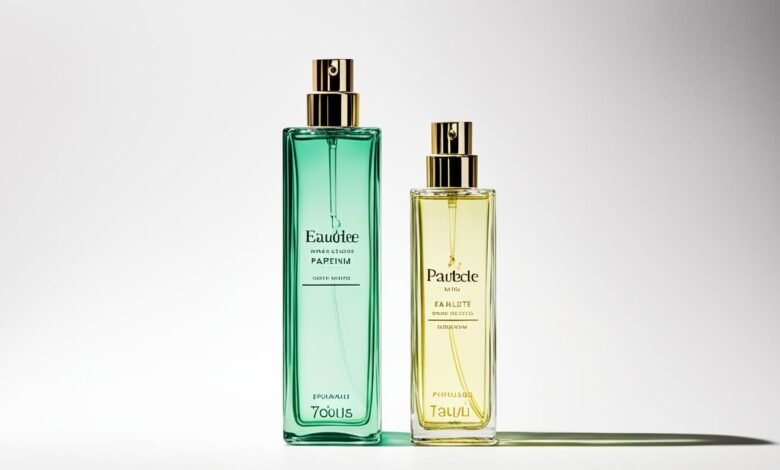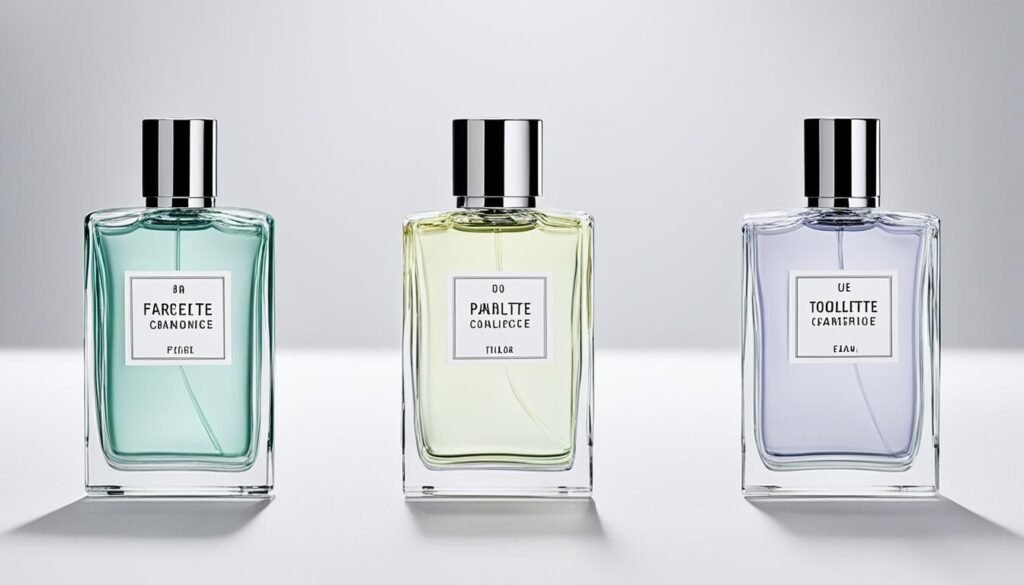Eau de Toilette vs Parfum: Which Fragrance to Choose?

Choosing the perfect fragrance can be tricky. Understanding the difference between Eau de Parfum and Eau de Toilette is key. Eau de Toilette has 5-15% fragrance concentration, while Eau de Parfum has 12-18%.
This affects how long the scent lasts and how far it spreads. Your choice depends on the event, time, and what you like.
Key Takeaways
- Eau de Parfum typically has a higher fragrance concentration than Eau de Toilette, resulting in a more intense and longer-lasting scent.
- Perfume extracts have the highest concentration, making them suitable for special occasions.
- Eau de Cologne and Eau Fraiche are less concentrated, offering a refreshing and invigorating sensation.
- Fragrance intensity, diffusion power, and persistence guide consumers’ choices in selecting the right fragrance type.
- Factors like application, combining with other products, and personal preferences influence the longevity and sillage of a fragrance.
Understanding Fragrance Concentrations
Fragrance concentration plays a key role in scent strength and longevity. Higher concentrations create more intense, long-lasting fragrances. Knowing these differences helps you pick the perfect perfume for your needs.
Perfume: The Highest Concentration
Perfume, or extrait de parfum, boasts the highest fragrance concentration. It contains 20% to 40% pure perfume oils, offering a powerful scent lasting up to 8 hours. This premium option comes with a higher price tag due to its rich ingredients.
Eau de Parfum: Rich and Long-Lasting
Eau de Parfum contains 15% to 20% perfume oils. It provides a rich scent that lingers for 4 to 5 hours. This popular choice works well for evening wear or special occasions.
| Fragrance Type | Perfume Oil Concentration | Scent Longevity |
|---|---|---|
| Perfume (Extrait de Parfum) | 20% – 40% | 6 – 8 hours |
| Eau de Parfum | 15% – 20% | 4 – 5 hours |
| Eau de Toilette | 5% – 15% | 3 – 4 hours |
| Eau de Cologne | 2% – 5% | 2 – 3 hours |
| Eau Fraîche | 1% – 3% | 1 – 2 hours |
Fragrance concentrations range from intense to light. This knowledge helps you select the ideal scent for any occasion. Choose between long-lasting intensity or a refreshing everyday fragrance.
Eau de Toilette vs Parfum
Fragrance concentration determines a scent’s staying power and strength. Eau de toilette and eau de parfum are two common types of fragrances. Their differences lie in oil concentration and lasting effects.
Defining Eau de Toilette
Eau de toilette is a light, refreshing fragrance with 5-15% perfume oil. It lasts about 2-3 hours on the skin. This subtle scent is perfect for everyday wear.
Defining Eau de Parfum
Eau de parfum contains 12-20% perfume oil, creating a richer, more intense fragrance. It can last up to 8 hours on the skin. Eau de parfum is known for its stronger projection and longer-lasting scent.
| Fragrance Type | Perfume Oil Concentration | Scent Longevity |
|---|---|---|
| Eau de Toilette | 5-15% | 2-3 hours |
| Eau de Parfum | 12-20% | Up to 8 hours |
Eau de parfum’s higher oil concentration makes it pricier than eau de toilette. Its enhanced sillage and scent longevity make it ideal for special occasions.
Eau de Toilette: Ideal for Daily Wear
Eau de toilette is perfect for everyday use. This refreshing fragrance is comfortable for daily wear. It won’t overwhelm in close-quarters settings like offices or while running errands.
Eau de toilette has a 2-3 hour longevity. This makes it practical for daytime wear. You can reapply as needed to maintain a fresh scent.
The 5-15% perfume oil concentration provides a well-balanced fragrance. It’s not overpowering, making it suitable for work or casual gatherings.
“Eau de toilette is the perfect choice for those who want a light, versatile fragrance that can be worn throughout the day without drawing too much attention.”
Eau de toilette is great for daily wear or as a fresh, office-friendly scent. Its balanced composition makes it practical and comfortable for everyday use.
Eau de Parfum: Perfect for Special Occasions
Eau de Parfum is ideal for special events and evening wear. It offers a richer, more intense scent that lasts longer. This fragrance concentration makes a lasting impression with its captivating sillage.
Eau de Parfum contains 15% to 20% fragrance oils. This higher concentration creates a deeper, more complex scent experience. It also ensures your fragrance stays noticeable throughout the night.
Enhancing the Fragrance Experience
Eau de Parfum shines at special events like date nights and formal gatherings. Its rich sillage captivates the senses of those around you. This fragrance leaves a lasting impression that lingers in the air.
At galas, weddings, or sophisticated soirees, Eau de Parfum elevates your evening wear. It effortlessly transitions from day to night. Your scent will leave a subtle yet enchanting trail wherever you go.
Fragrance Notes and Compositions
Fragrance compositions blend various fragrance notes to create captivating scents. These compositions typically include top notes, middle notes, and base notes. Each plays a unique role in the overall fragrance experience.
Top notes are the initial scents you detect when applying a fragrance. They’re usually light and fresh, often featuring citrus or floral aromas. These notes tend to fade quickly.
Middle notes, also called the heart, emerge as top notes dissipate. They provide the core scent that lingers on the skin. These notes form the fragrance’s main character.
Base notes are the final, persistent aromas that last the longest. They often feature woody, musky, or amber-like scents. Base notes provide depth and longevity to the fragrance.
The interplay between these notes creates a fragrance’s unique personality. Understanding this composition helps you appreciate the complexity of your favorite scents.
| Fragrance Category | Concentration of Odorous Materials | Approximate Lasting Power |
|---|---|---|
| Eau de Cologne (EDC) | 3-5% | 1-2 hours |
| Eau de Toilette (EDT) | 7-10% | 3-4 hours |
| Eau de Parfum (EDP) | 10-20% | up to 6 hours |
| Perfume Extract | over 20% | all day |
The concentration of fragrance notes distinguishes various fragrance categories. Higher concentrations result in more intense, long-lasting scents. Lighter formulations offer a refreshing and invigorating experience.
“Fragrance is the thread that connects our past, present, and future.”
Scent Longevity and Sillage
Understanding scent longevity and sillage is key when choosing a fragrance. These factors affect how long the scent lasts and how others perceive it. They greatly impact your overall fragrance experience.
Eau de Toilette: Lighter and Fresher
Eau de Toilette has a lower concentration of perfume oils. It offers a lighter, refreshing scent that lasts about 2-3 hours on the skin. This makes it ideal for daily wear, providing a subtle aroma without overwhelming the senses.
Eau de Parfum: Richer and More Intense
Eau de Parfum has a higher concentration of perfume oils. It creates a richer, more intense fragrance lasting up to 8 hours. The increased concentration leads to a stronger sillage, or lingering fragrance trail.
Eau de Parfum is better for special occasions. It’s perfect when you want your scent to leave a lasting impression. Skin chemistry, body temperature, and environment can also affect fragrance longevity and projection.
People with oily skin may find fragrances last longer. Those with dry skin might experience shorter scent duration. Warm weather can enhance sillage and intensity, while cool temperatures create a subtler experience.
Consider the occasion, your preferences, and desired fragrance intensity when choosing. Understanding these differences helps you select the perfect scent for a memorable experience.

Eau de Cologne and Eau Fraiche
Eau de cologne and eau fraiche are two fragrance types with lower concentrations. They offer unique scent experiences and lasting power compared to other perfume categories.
Eau de cologne contains 2-4% perfume oil. It provides a light, citrusy scent that lasts up to 2 hours. This refreshing fragrance is perfect for daily wear or as a quick pick-me-up.
Eau fraiche is the lightest option with 1-3% perfume oil. It uses a water base instead of alcohol. This creates a subtle scent that can also last up to 2 hours.
These lower-concentration fragrances offer versatile options for daily use. They provide a gentle way to incorporate scent into your routine without being overwhelming.
“Fragrance has always been a part of my life – I remember the scent of my mother’s perfume when I was a child.” – Audrey Hepburn
Choosing the Right Fragrance Strength
Picking between Eau de Toilette and Eau de Parfum depends on the event and your taste. Eau de Toilette is great for daily use, giving a light, fresh scent. Eau de Parfum suits special events, offering a richer, intense fragrance.
Weather can also affect your choice. Eau de Toilette works well in warm, humid climates. It won’t overpower your senses. Eau de Parfum provides a cozy scent during cooler weather.
Seasonal and Situational Considerations
- Eau de Toilette is ideal for everyday wear, offering a lighter, more refreshing fragrance.
- Eau de Parfum is perfect for special occasions, providing a richer and more long-lasting scent experience.
- In warm weather, the lighter Eau de Toilette may be more suitable, while the Eau de Parfum can be better suited for cooler climates.
- Personal preference plays a significant role in choosing the right fragrance strength, so be sure to experiment with different options to find your signature scent.
Your choice between Eau de Toilette and Eau de Parfum is personal. Consider the event, season, and your style. Try different options to find your perfect scent match.
eau de toilette vs parfum
Eau de toilette and parfum differ mainly in their fragrance concentration. This impacts how long the scent lasts and its trail. Understanding these differences helps you choose the right fragrance for your needs.
Eau de Toilette has a lower concentration of perfume oil, usually 5-15%. It creates a lighter, refreshing scent that lasts about 2-3 hours on skin.
Eau de parfum contains 12-20% perfume oil. This higher concentration produces a richer, more intense fragrance. It lasts up to 8 hours and leaves a stronger scent trail.
| Fragrance Concentration | Eau de Toilette | Eau de Parfum |
|---|---|---|
| Perfume Oil Content | 5-15% | 12-20% |
| Scent Longevity | 2-3 hours | Up to 8 hours |
| Sillage (Fragrance Trail) | Lighter | More pronounced |
Your choice depends on your preference, desired scent intensity, and the occasion. Eau de toilette works well for everyday use. It provides a subtle, refreshing scent.
Eau de parfum suits special occasions better. It offers a more noticeable and long-lasting fragrance experience.

“Fragrance is the ultimate form of personal expression – it’s your invisible signature.”
Proper Storage for Longevity
Proper storage is vital for preserving your fragrance’s allure and potency. Keep perfumes in a cool, dark place away from sunlight and humidity. Avoid storing them in bathrooms due to temperature changes and moisture.
Replace your fragrance if it changes color or smells sour or metallic. Good storage habits can extend your favorite scents’ lifespan for years.
Optimal Storage Conditions
- Temperature Stability: Perfumes are sensitive to temperature changes. Store them in a cool environment between 15°C and 18°C (59°F to 64°F).
- Light Protection: Sunlight can degrade fragrance compounds. Keep perfumes in dark areas like dresser drawers or closets.
- Low Humidity: High humidity can alter scents through oxidation. Avoid storing perfumes in bathrooms or areas with changing moisture levels.
These simple storage tips will help preserve your fragrance collection. Your signature scent will continue to captivate and delight.
“Proper storage is the key to maintaining the allure and potency of your fragrance.”
Finding Your Signature Scent
Finding your signature scent is a personal adventure. Try both Eau de Toilette and Eau de Parfum versions to find your perfect match. This helps you see how the scent works with your body chemistry.
Layering fragrances can create a unique signature scent. Mix different notes and strengths to make a scent that’s all yours. The fragrance that boosts your confidence will become your signature scent.
| Fragrance Note | Top Notes | Middle Notes | Base Notes |
|---|---|---|---|
| Floral | Citrus, Herbal, Spicy | Floral, Fresh | Woody, Warm |
| Oriental | Spicy, Exotic | Floral, Warm | Woody, Amber |
| Woody | Citrus, Aromatic | Floral, Green | Woody, Earthy |
| Fresh | Citrus, Aquatic | Floral, Green | Musk, Woody |
Understanding fragrance notes helps you find a scent that fits you. Explore floral, oriental, woody, or fresh fragrances to discover your unique scent.
Your perfect fragrance will match your style and lifestyle. It will become your special scent signature.
“The perfect fragrance is the one that makes you feel confident and truly reflects your individual style.”
Conclusion
Eau de Toilette and Eau de Parfum offer different fragrance experiences. Eau de Toilette has a lighter fragrance concentration and shorter scent longevity. It’s great for everyday use. Eau de Parfum has a richer, more intense scent for special occasions.
The differences in fragrance concentration, scent longevity, and sillage help you pick the right fragrance. Test both options and think about when you’ll wear it. Consider your personal scent likes too.
Try both Eau de Toilette and Eau de Parfum to find your perfect match. Eau de Toilette is fresh and airy. Eau de Parfum is more captivating. Explore different scents to discover your signature fragrance.
FAQ
What is the difference between Eau de Toilette and Eau de Parfum?
Eau de Toilette has 5-15% perfume oil, creating a light scent lasting 2-3 hours. Eau de Parfum contains 12-20% perfume oil, offering a richer fragrance that lasts up to 8 hours. The higher concentration in Eau de Parfum results in a more intense and long-lasting scent.
How do the fragrance concentrations of Eau de Toilette, Eau de Parfum, and other types compare?
Perfumes have the highest concentration, over 20% perfume oil, lasting 6-8 hours. Eau de Parfum contains 15-20% oil, lasting 4-5 hours.
Eau de Toilette has 5-15% oil, lasting 2-3 hours. Eau de Cologne has 2-4% oil, lasting up to 2 hours. Eau Fraiche is the lightest, with 1-3% oil in a water base.
What is the difference between the scent of Eau de Toilette and Eau de Parfum?
Eau de Toilette has a lighter, refreshing scent due to lower fragrance concentration. Eau de Parfum offers a richer, more intense fragrance with stronger sillage. The higher concentration in Eau de Parfum creates a more noticeable and lasting scent.
When should I choose Eau de Toilette versus Eau de Parfum?
Eau de Toilette suits daily wear, like office or errands. Its lighter scent is comfortable for everyday use. Eau de Parfum is ideal for special occasions and evenings.
The richer fragrance and longer-lasting sillage of Eau de Parfum create a more captivating experience. Choose based on the occasion and desired scent intensity.
How do the various fragrance notes contribute to the overall scent?
Fragrances have top, middle, and base notes. Top notes are light and fresh, like citrus or floral scents. Middle notes form the core scent as top notes fade.
Base notes are the final, lingering aromas, often woody or musky. The combination of these notes creates a unique fragrance character.
How can I properly store my fragrances to maintain their longevity?
Store fragrances in a cool, dark place away from sunlight and humidity. Avoid keeping perfumes in the bathroom, as humidity can affect the scent. Replace fragrances if their color changes or they develop an unpleasant smell.
How can I find my signature scent?
Test both Eau de Toilette and Eau de Parfum versions of fragrances. Consider how the scent interacts with your body chemistry and preferences. Try layering fragrances to create a unique scent.
Choose a fragrance that makes you feel confident and reflects your style. Your perfect scent is one that truly resonates with you.





